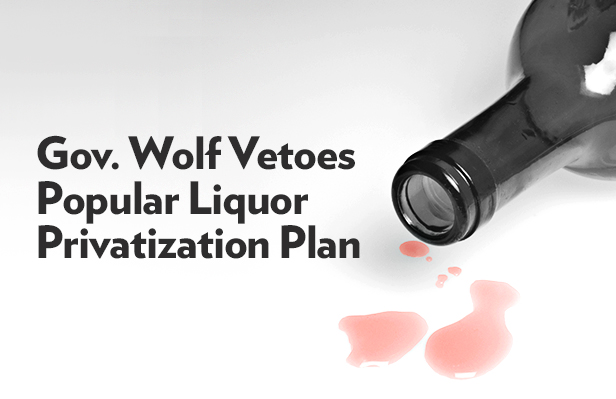Media

Poor Excuses Used to Prolong PLCB’s Power
Gov. Wolf missed an opportunity to be a different kind of governor. He was positioned to finally end the corrupt and inefficient state-controlled liquor system. He opted for the status quo instead.
In a press release explaining his veto of liquor privatization, the governor parrots talking points used by the United Food and Commerical Workers (UFCW)—the state store employees union—to explain why the government needs to sell wine and spirits. Needless to say, the excuses fail the red-face test.
Let’s take them one by one:
This legislation falls short of a responsible means to reform our state liquor system and to maximize revenues to benefit our citizen[sic]…
The primary function of the Pennsylvania Liquor Control Board (PLCB) should not be to wring dollars from consumers. But, for the sake of argument, let’s say it should. The privatization plan put forth by Republicans raises $220 million annually. In contrast, the governor’s own “modernization” plan raises $185 million. If maximizing revenue is the goal, the Republican plan wins.
It makes bad business sense for the Commonwealth and consumers to sell off an asset, especially before maximizing its value.
The PLCB isn’t an asset. In fact, the agency’s net income is scheduled to decline due to operating costs. It’s a liability. And it has consistently failed taxpayers and entrepreneurs. And if the governor is truly concerned about “bad business sense” then perhaps he should study the PLCB’s recent history, lest we forget TableLeaf wine, the failed kiosks, the Wine Shrine…
During consideration of this legislation, it became abundantly clear that this plan would result in higher prices for consumers.
The governor has a point. Increasing revenue by $220 million annually through licenses, permits and renewal fees will lead to higher prices. But the governor’s alternative, liquor modernization, gives the PLCB the power to mark up the prices of its products. In other words, you pay more under his favored plan too.
In the most recent case of another state that pursued the outright privatization of liquor sales, consumers saw higher prices and less selection.
Although he doesn’t state it explicitly, it appears Gov. Wolf is referring to liquor privatization in Washington. But privatization isn’t to blame for the price increases. The real culprit is the state’s liquor taxes, which are the highest in the nation. As for the claim about selection, the number of WA liquor stores increased by 327 percent. It defies logic to suggest a large increase in stores led to a decline in selection.
Enough excuses. Free the booze.